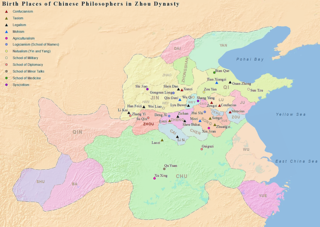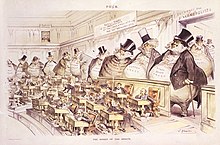
In European Christianity, the divine right of kings, divine right, or God's mandation, is a political and religious doctrine of political legitimacy of a monarchy. It is also known as the divine-right theory of kingship.
Natural law is a system of law based on a close observation of natural order and human nature, from which values thought, by the proponents of this concept to be intrinsic to human nature, can be deduced and applied independently of positive law. According to the theory of law called jusnaturalism, all people have inherent rights, conferred not by act of legislation but by "God, nature, or reason." Natural law theory can also refer to "theories of ethics, theories of politics, theories of civil law, and theories of religious morality."

Political philosophy or political theory is the philosophical study of government, addressing questions about the nature, scope, and legitimacy of public agents and institutions and the relationships between them. Its topics include politics, liberty, justice, property, rights, law, and the enforcement of laws by authority: what they are, if they are needed, what makes a government legitimate, what rights and freedoms it should protect, what form it should take, what the law is, and what duties citizens owe to a legitimate government, if any, and when it may be legitimately overthrown, if ever.
A republic, based on the Latin phrase res publica, is a state in which political power rests with the public through their representatives—in contrast to a monarchy.

A tyrant, in the modern English usage of the word, is an absolute ruler who is unrestrained by law, or one who has usurped a legitimate ruler's sovereignty. Often portrayed as cruel, tyrants may defend their positions by resorting to repressive means. The original Greek term meant an absolute sovereign who came to power without constitutional right, yet the word had a neutral connotation during the Archaic and early Classical periods. However, Greek philosopher Plato saw tyrannos as a negative word, and on account of the decisive influence of philosophy on politics, deemed tyranny the "fourth and worst disorder of a state."
Tyrants lack "the very faculty that is the instrument of judgment"—reason. The tyrannical man is enslaved because the best part of him (reason) is enslaved, and likewise, the tyrannical state is enslaved, because it too lacks reason and order.

The Hundred Schools of Thought were philosophies and schools that flourished from the 6th century BC to 221 BC during the late Spring and Autumn period and the Warring States period of ancient China.
In philosophy, economics, and political science, the common good is either what is shared and beneficial for all or most members of a given community, or alternatively, what is achieved by citizenship, collective action, and active participation in the realm of politics and public service. The concept of the common good differs significantly among philosophical doctrines. Early conceptions of the common good were set out by Ancient Greek philosophers, including Aristotle and Plato. One understanding of the common good rooted in Aristotle's philosophy remains in common usage today, referring to what one contemporary scholar calls the "good proper to, and attainable only by, the community, yet individually shared by its members."
The family as a model for the organization of the state is a theory of political philosophy. It explains the structure of certain kinds of state in terms of the structure of the family, or it attempts to justify certain types of state by appeal to the structure of the family. The first known writer to use it was Aristotle, who argued that the natural progression of human beings was from the family via small communities to the polis.
Politeia is an ancient Greek word used in Greek political thought, especially that of Plato and Aristotle. Derived from the word polis ("city-state"), it has a range of meanings from "the rights of citizens" to a "form of government".
Classical republicanism, also known as civic republicanism or civic humanism, is a form of republicanism developed in the Renaissance inspired by the governmental forms and writings of classical antiquity, especially such classical writers as Aristotle, Polybius, and Cicero. Classical republicanism is built around concepts such as liberty as non-domination, self-government, rule of law, property-based personality, anti-corruption, abolition of monarchy, civics, civil society, common good, civic virtue, popular sovereignty, patriotism and mixed government.

Republic is a Socratic dialogue, authored by Plato around 375 BC, concerning justice, the order and character of the just city-state, and the just man. It is Plato's best-known work, and one of the world's most influential works of philosophy and political theory, both intellectually and historically.
Mirrors for princes or mirrors of princes was a literary genre of didactic political writings throughout the Middle Ages and the Renaissance. It was part of the broader speculum or mirror literature genre.
In political philosophy, the right of revolution is the right or duty of a people to "alter or abolish" a government that acts against their common interests or threatens the safety of the people without justifiable cause. Stated throughout history in one form or another, the belief in this right has been used to justify various revolutions, including the American Revolution, French Revolution, the Russian Revolution, and the Iranian Revolution.

Absolutism or the Age of Absolutism is a historiographical term used to describe a form of monarchical power that is unrestrained by all other institutions, such as churches, legislatures, or social elites. The term 'absolutism' is typically used in conjunction with some European monarchs during the transition from feudalism to capitalism, and monarchs described as absolute can especially be found in the 16th century through the 19th century. Absolutism is characterized by the ending of feudal partitioning, consolidation of power with the monarch, rise of state power, unification of the state laws, and a decrease in the influence of the church and the nobility.

Thomas Aquinas was an Italian Dominican friar and priest, an influential philosopher and theologian, and a jurist in the tradition of scholasticism from the county of Aquino in the Kingdom of Sicily.
An unjust law is no law at all is an expression in support of natural law, acknowledging that authority is not legitimate unless it is good and right. It has become a standard legal maxim around the world.
Romanticism originated in the second half of the 18th century at the same time as the French Revolution. Romanticism continued to grow in reaction to the effects of the social transformation caused by the Revolution. There are many signs of these effects of the French Revolution in various pieces of Romantic literature. By examining the influence of the French Revolution, one can determine that Romanticism arose as a reaction to the French Revolution. Instead of searching for rules governing nature and human beings, the romantics searched for a direct communication with nature and treated humans as unique individuals not subject to scientific rules.
In Plato's Republic, Socrates is highly critical of democracy and proposes an aristocracy ruled by philosopher-kings.
"Insurrectionist Theory" is a belief system that took shape in the United States, often relating to the Second Amendment to the U.S. Constitution, that highlights the argument supporting the right to bear arms. Simply stated, it is a proposition arguing that “the possession of firearms by individuals serves as the ultimate check on the power of government”. Its proponents assert a right of revolution, which entails armed revolt premised on resistance against a perceived tyrannical government. The theory holds that individuals should bears arms as a "check" on the power of the government, invoking the constitutional concept of "consent of the governed". This theory is not accepted in American jurisprudence or case law, but relates to many popularly-held American values about sovereignty and has roots in the anti-monarchical character of the founding of the United States. This theory is often associated with the American militia movement and other anti-governmental groups.









